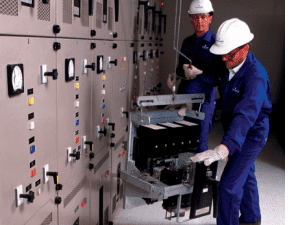Electrical Maintenance Testing and Engineering Services
Electrical Maintenance Testing
and Engineering Services
 Our testing and engineering service group, working in conjunction with Vertiv Services, offers a complete line of electrical maintenance testing and engineering services.
A comprehensive program of electrical services helps identify the root cause of system availability problems, avoid costly downtime, preempt emergency repairs, and maintain a safe operating environment.
Vertiv Services offers a full range of electrical maintenance testing and engineering Services designed to ensure optimal performance of your data center.
Our testing and engineering service group, working in conjunction with Vertiv Services, offers a complete line of electrical maintenance testing and engineering services.
A comprehensive program of electrical services helps identify the root cause of system availability problems, avoid costly downtime, preempt emergency repairs, and maintain a safe operating environment.
Vertiv Services offers a full range of electrical maintenance testing and engineering Services designed to ensure optimal performance of your data center. There are two primary benefits from implementing effective preventive maintenance in a facility:
1) Reduced costs of repairs and minimized or eliminated downtime.
2) Safety for personnel and property damage.
Positives in Developing an Electrical Testing Program
Good economic judgment is necessary for developing an effective electrical preventive maintenance program. As indicated earlier, two objectives of such a program should be focused on enhancing safety and reducing equipment failure and loss. The program should include regular inspections, periodic testing and servicing of equipment, and effective record-keeping.
There are four basic steps that should be taken to develop an electrical preventive maintenance program. First, compile a list of electrical equipment in the facility. Second, determine which equipment is most critical for the operation. Third, implement a monitoring system for length of use and duty cycles, and identify signs of failure or fatigue. Fourth, identify the resources needed to implement the maintenance program.
Training and Safe Work Practices.
The technician performing periodic maintenance and service of electrical equipment should have a thorough understanding of the electrical field and should be trained and familiar with the equipment and systems they must maintain and work on. Qualified and trained personnel understand the construction and operation of equipment and installations, and they have safety training to recognize and avoid the hazards involved.
The definition of a qualified person is the same in the National Electrical Code (NEC) as it is in NFPA 70B, Recommended Practice for Electrical Equipment Maintenance.
Summary
Preventive maintenance is often ignored and considered too expensive to implement. In reality, it is a valuable investment that is measurable. Preventive maintenance can help avoid equipment failure, alleviate repair and replacement costs, and increase safety for personnel. It should not be treated as an unnecessary investment.
The NEC includes mandatory requirements for periodic maintenance of essential power systems. While preventive maintenance is not required for general, nonessential loads, it is recommended.
Various resources with information about preventive maintenance programs are available—some simple, some really complex. Refer to the information in NFPA 70B, Recommended Practice for Electrical Preventive Maintenance, for more detailed information about effective programs.
Circuit Breaker Testing
